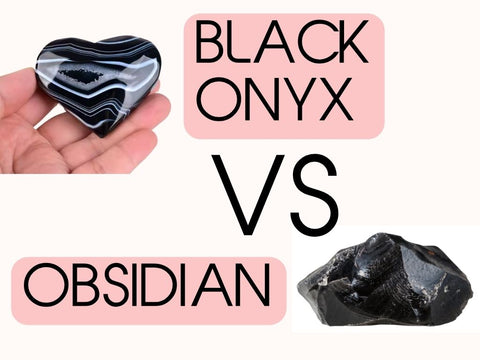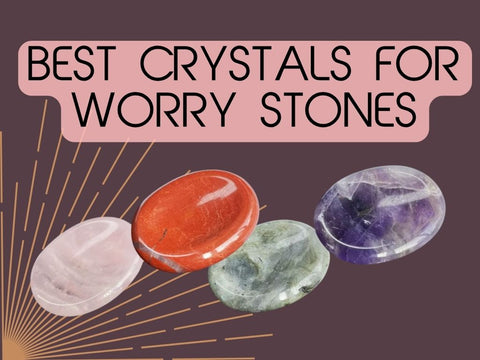Black onyx and black obsidian look super similar—but their energy? Totally different. If you’re not sure which one to reach for, you’re not alone. In this post, you’ll learn the key differences between these two powerful stones, from how they’re formed to what they’re best used for in your spiritual practice.
At first, these dark beauties look almost the same. But their stories are very different. One comes from deep in the earth, formed over time. The other is born from volcanic fire and cools quickly.
Knowing their differences helps you pick the right stone for your spiritual path. We'll show you how they form and what energies they hold. This knowledge lets you make a choice that matches your soul's needs.
By comparing these black gemstones, you'll find which one fits your journey best. You'll learn more about these powerful allies as we explore them together.
Key Takeaways
- These two dark stones form through completely different geological processes
- Each stone carries distinct energetic vibrations for spiritual practice
- Physical characteristics help distinguish between the two minerals
- Understanding their origins guides proper selection for healing work
- Both stones offer powerful grounding properties with unique applications
- Proper identification prevents confusion when building your crystal collection
Formation and Physical Properties of These Black Gemstones
Deep inside Earth, two different ways create the black gemstones we love. These stories show why obsidian properties are different from black onyx. Knowing how they form helps pick the right stone for your spiritual path.
Chalcedony Formation Process
Black onyx comes from chalcedony, a type of quartz. Over thousands of years, silica-rich water flows through rocks. Each drop adds tiny quartz crystals in layers.
This slow process makes onyx's banded patterns. The black color comes from trapped organic matter and iron. This careful making gives onyx strength and stability.
The chalcedony needs the right conditions to form. It needs steady temperature, mineral flow, and a calm environment. This careful making gives onyx grounding energy for spiritual growth.
Volcanic Glass Creation
Obsidian comes from volcanic eruptions. When lava with lots of silica erupts, it meets the cool air. This quick cooling stops crystals from forming.
This creates volcanic glass with a smooth surface. Unlike onyx, obsidian forms quickly in intense heat and pressure. This captures the raw energy of volcanoes.
Different eruptions make obsidian look different. The lava's minerals decide the stone's color and patterns. You might see jet black, colorful sheens, or patterns like snowflake obsidian.
Physical Properties and Hardness Differences
Black onyx is 6.5 to 7 on the Mohs hardness scale. It's good for jewelry because it's hard and doesn't scratch easily.
Volcanic glass obsidian is softer, at 5 to 5.5. It's easier to carve but needs careful handling. Sharp edges can form when it breaks, used for tools.
These hardness levels show their spiritual uses. Onyx is steady and protective, while obsidian gives quick insights. Both stones are important for spiritual growth, each with its own gifts.
Black Onyx vs Obsidian: Key Differences and Uses
Black onyx and obsidian are two powerful stones with unique energies. They help in different ways for spiritual growth and healing. Even though they look similar, their origins and properties are different.
Visual Identification and Appearance
Black onyx has a deep, consistent black color and a waxy look. It feels grounding. You'll see thin white or gray lines, showing its layered formation.
Obsidian has a brilliant, mirror-like surface that reflects light well. It can be pure black or have snowflake patterns, rainbow sheens, or golden highlights.
The surface quality is a big difference. Onyx is matte to slightly glossy, while obsidian is like polished glass. Obsidian also has translucent edges when held up to light.
Healing Properties and Metaphysical Meanings
The black onyx meaning is about protection and emotional stability. It absorbs negative energies and gives strength in tough times. It grounds your energy and helps you get through challenges.
Black onyx helps with self-control and rational thinking. It's used to overcome grief, reduce stress, and build confidence in making decisions.
Obsidian is like a spiritual scalpel that cuts through illusions. It brings up suppressed emotions for healing. It's great for shadow work and releasing old patterns.
Onyx offers steady support, while obsidian is intense and transformative. Both are valuable in spiritual practice.
Jewelry Applications and Durability
When choosing between obsidian and black onyx jewelry, durability is key. Black onyx is 6.5-7 on the Mohs hardness scale, making it good for daily wear. It keeps its shine and resists scratches.
Obsidian is 5-5.5, so it's better for pendants and earrings where it's less likely to get hit. Its reflective quality looks great in these pieces, but it can chip or crack if hit hard.
Onyx is better for engagement rings or wedding bands because it's more durable. Obsidian is great for statement pieces where its look can be enjoyed without worrying about daily wear.
Both stones can be cut and set in various ways, but obsidian needs more care during crafting. Jewelers often suggest protective settings for obsidian to avoid damage.
Making Your Choice Between These Powerful Black Stones
Your journey into black crystal identification shows both stones have unique gifts. The debate between black onyx and obsidian depends on your current needs and energy preferences.
Black onyx is your steady companion for daily protection and grounding. Its chalcedony structure offers consistent, reliable energy. This is great for jewelry or meditation needing stable focus.
Obsidian, on the other hand, brings intense transformation. Its volcanic glass nature cuts through illusions and reveals hidden truths. Choose obsidian for deep healing or clarity in tough life situations.
The difference in volcanic glass vs chalcedony formation gives each stone a unique energy. Trust your intuition as you explore these black crystals. Your body and spirit will guide you to the stone that matches your current growth phase.
We suggest working with both stones over time. Each offers valuable lessons and support for different aspects of your spiritual journey. Let these ancient Earth allies help you discover deeper truths about yourself and your path forward.
FAQ
How can I tell the difference between black onyx and obsidian just by looking at them?
Black onyx has a deep, consistent black color with a waxy luster. It often shows subtle banding patterns. Obsidian, on the other hand, has a brilliant mirror-like surface that reflects light beautifully.



